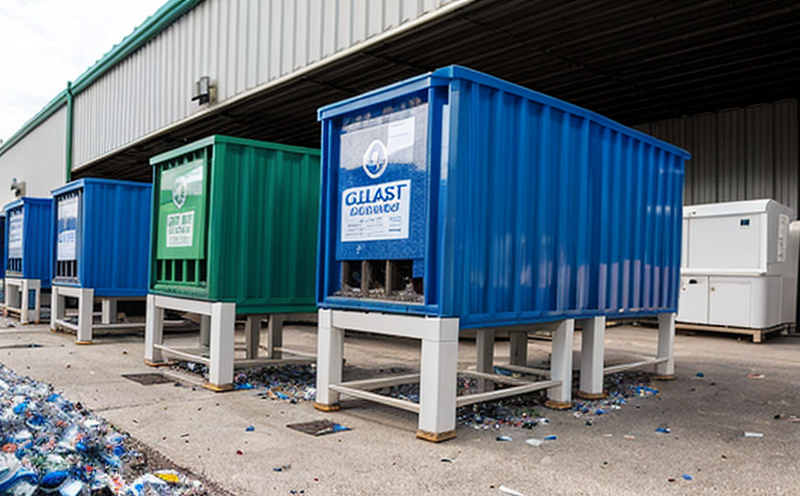EN 12933 Ceramic Waste Shear Strength
The European Standard EN 12933 defines methods for determining the shear strength of ceramic waste materials. This test is crucial in evaluating the mechanical properties of recycled ceramics, which are increasingly used in various applications such as construction, paving slabs, and landscaping products.
Ceramic waste recycling involves breaking down broken or discarded ceramic items into smaller particles suitable for reuse. The shear strength testing ensures that these recycled materials meet necessary quality standards before being incorporated into new products. This test is especially important because it helps prevent structural failures in the end products due to insufficient shear strength, which could compromise safety and durability.
The standard specifies a cylindrical specimen with dimensions of 40 mm diameter by 35 mm height, made from ground ceramic waste particles. The specimens are carefully prepared according to EN 12933 specifications to ensure consistency in testing results.
Shear strength is determined using a shear test machine that applies a constant load at a specified rate until the specimen fails. Load cells measure the force applied during this process, and displacement sensors monitor any lateral movement of the specimens. The point at which failure occurs indicates the shear strength value.
The acceptance criteria for EN 12933 typically require that recycled ceramic materials achieve a minimum specified shear strength to qualify as a suitable candidate for reprocessing or use in new products. Non-compliance could lead to product failures, safety hazards, and increased costs associated with rework or scrap disposal.
In summary, the EN 12933 Ceramic Waste Shear Strength test plays a vital role in ensuring that recycled ceramic materials are safe, reliable, and of sufficient quality for reuse. This process supports sustainable waste management practices by promoting efficient use of resources while minimizing environmental impact.
Quality and Reliability Assurance
The EN 12933 Ceramic Waste Shear Strength test is a critical component in the quality assurance program for ceramic waste recycling operations. By consistently applying this standard, laboratories can ensure that their recycled materials meet or exceed industry expectations.
A robust quality control process includes regular calibration of testing equipment, adherence to standardized specimen preparation methods, and consistent application of load and displacement measurement techniques. These practices help maintain the integrity of test results, allowing for accurate assessment of material properties.
Reliability assurance is achieved through rigorous documentation of all testing procedures and outcomes. This ensures traceability and repeatability, enabling stakeholders to verify compliance with standards like EN 12933.
Incorporating this test into a broader quality management system enhances the overall reliability and safety of recycled ceramic products. It also fosters trust among consumers who value sustainability and responsible waste management practices.
Competitive Advantage and Market Impact
Implementing rigorous testing protocols such as EN 12933 Ceramic Waste Shear Strength can provide significant competitive advantages in the marketplace. By demonstrating commitment to quality and sustainability, businesses can attract environmentally conscious consumers and partners.
Meeting or exceeding industry standards like EN 12933 positions companies at the forefront of sustainable waste management solutions. This can lead to increased market share and customer loyalty as more people prioritize eco-friendly products.
The test results also provide valuable data for continuous improvement efforts within recycling operations. Identifying areas where performance falls short allows for targeted enhancements, ultimately leading to higher-quality outputs and reduced costs associated with substandard materials.
Moreover, compliance with international standards enhances credibility among regulatory bodies and industry associations, opening doors to new markets and opportunities for collaboration.
Use Cases and Application Examples
- Civil Engineering: Recycled ceramic materials are used in road construction projects where their high strength-to-weight ratio offers excellent performance characteristics.
- Construction Industry: These materials find application as paving stones, bricks, and other structural components due to their durability and aesthetic appeal.
- Landscaping: Recycled ceramic chips serve as mulch or pathway materials, providing a sustainable alternative to traditional gravel or sand.
- Biomaterials: Certain recycled ceramics can be processed into biocompatible materials for medical applications, leveraging their inherent properties for improved patient outcomes.
In each of these sectors, the EN 12933 Ceramic Waste Shear Strength test ensures that recycled ceramic products meet stringent mechanical property requirements, thereby enhancing product performance and reliability.





